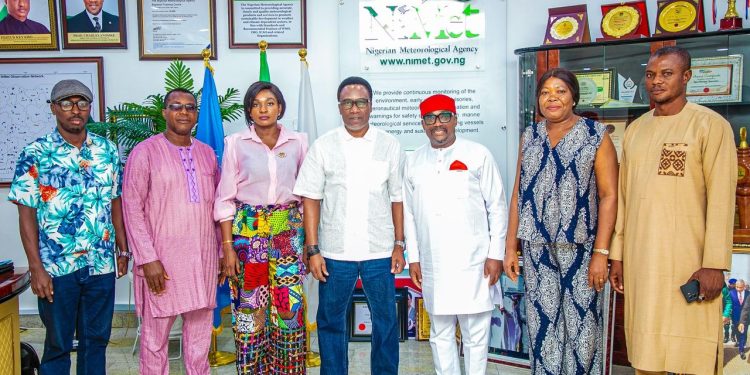…as agencies commit to deepen collaboration, sign MoU to safeguard water resources, infrastructure, and food security in Nigeria’s Southeast
By Nkechi Eze
In a decisive move to confront the mounting threats of climate change on Nigeria’s river basin systems, the Nigerian Meteorological Agency (NiMet) and the Anambra-Imo River Basin Development Authority (AIRBDA) have initiated a robust partnership aimed at safeguarding lives, infrastructure, and livelihoods through data-driven early warning, integrated water management, and collaborative resilience-building strategies.
The meeting, held on June 27, 2025, at the NiMet headquarters in Abuja, brought together top leadership of both institutions to chart a way forward in addressing the hydrological and agricultural vulnerabilities posed by erratic weather events in southeastern Nigeria. Welcoming the delegation, Director General and Chief Executive Officer of NiMet, Professor Charles Anosike, offered a sobering analysis of the disruptive effects of climate change on rainfall distribution and temperature, warning that these changes are increasingly undermining the stability of river basins.
“These shifts can significantly alter the hydrological characteristics of our river systems,” Professor Anosike noted. “The result is a greater frequency and intensity of extreme events like flooding and droughts, with cascading consequences for food production, infrastructure, and economic stability. We cannot afford to be reactive, we must be predictive, preventive, and prepared.”
He emphasized the inextricable link between meteorology and hydrology, stating that climatic elements such as precipitation and temperature directly influence the flow dynamics and water retention of river basins, while, conversely, the terrain, land use, and vegetation patterns of basins can also affect local weather phenomena. He pointed to NiMet’s flagship Seasonal Climate Prediction (SCP) as an indispensable tool for anticipating extreme weather events and enabling informed decision-making across multiple sectors.
“Our SCP is a critical national asset. When used effectively, it empowers stakeholders to take proactive measures to mitigate risks, optimize irrigation scheduling, protect dam infrastructure, and support smart agricultural planning,” he explained. “This is why enhanced collaboration with agencies like AIRBDA is not only desirable, it is essential.”
On his part, the Managing Director and CEO of AIRBDA, Rt. Hon. Emeka Nduka, expressed profound appreciation for NiMet’s strategic leadership and reiterated the commitment of his agency to forge deeper technical cooperation in the face of rapidly changing climatic conditions. He acknowledged that climate variability has made water resource management more complex, noting that NiMet’s data and predictive services are invaluable for guiding decisions on dam operations, irrigation development, and flood risk management.
“We are fully aligned with the need to adopt a science-based, climate-smart approach to managing our river basins,” Nduka said. “NiMet’s capacity in forecasting and data modeling is critical to achieving this, and we are here to solidify our partnership and strengthen our operational synergy.”
He affirmed AIRBDA’s readiness to collaborate in producing region-specific data products, sharing expertise, and co-designing capacity-building initiatives for technical officers. The visit concluded with both agencies agreeing to formalize their renewed collaboration through a Memorandum of Understanding (MoU), which will focus on real-time data exchange, disaster risk reduction, climate-smart agriculture, and joint research initiatives.
The agreement is expected to catalyze a new era of inter-agency cooperation aimed at building climate resilience in vulnerable communities, especially those located within flood-prone catchment areas across the southeast corridor of the country. The partnership also aligns with Nigeria’s broader national adaptation goals and its commitment to the United Nations Sustainable Development Goals (SDGs), particularly in the areas of zero hunger, clean water and sanitation, and climate action.















